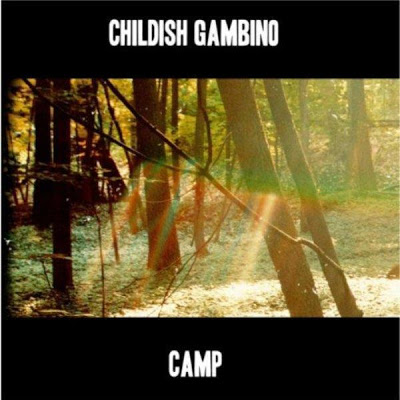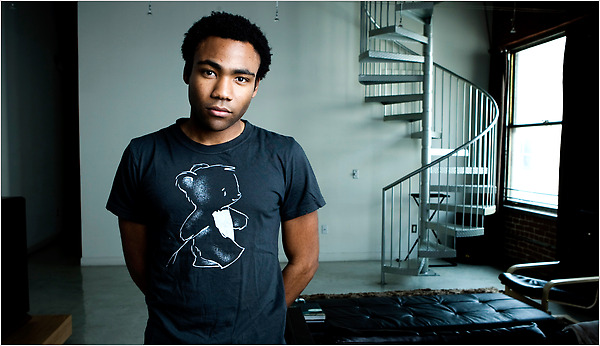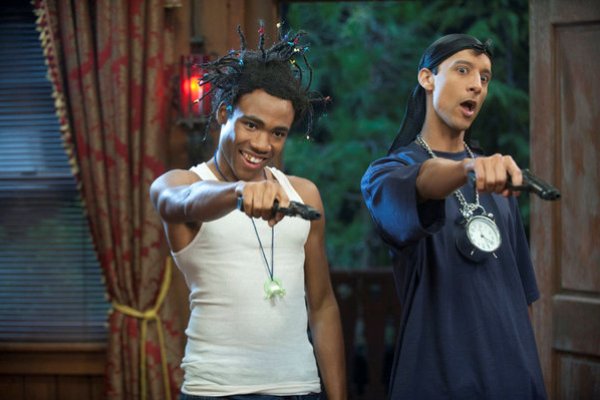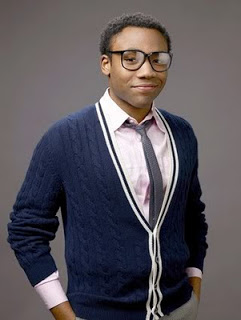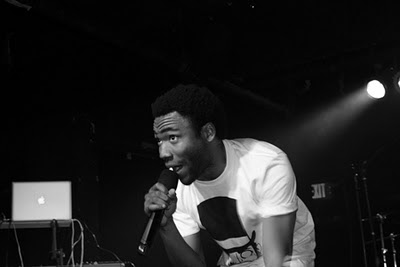After working Christmas weekend, I took a few days off to ring in 2012 in my hometown Philadelphia.
My fiancee and I packed four days visiting family and friends, sucking down unholy amounts of food and sweets in the process while adding 800 miles to my car.
But I had a new companion for those long drives by picking up Childish Gambino’s Camp album.
You may not know that name, but you likely know his mild-mannered alter ego, actor-comedian Donald Glover aka “the black guy from Community” and “the black guy some people wanted to play Spider-Man.”
I’d heard some of Glover’s Gambino tracks before online, but for me it’s tough to really listen in the same way when the tunes are on my stereo or iPod. But I liked them enough to give Camp, his first full-length album, a try.
Glover has made a true blerd’s rap album.
While several rappers out there already are blerds, in my opinion, they still cloak themselves in street cool and slip the blerdiness past you. (Kanye West and Lil Wayne do this all the time.) But Glover is an “out” blerd, and he can’t hide it in his music.
On “Bonfire” he gives a shout-out “to my blerds, they represent the realness.” Realness can be relative.
As many blerds do, including myself, Glove ruminates on his blerd identity and that realness. Or, namely, keepin’ it real. If blerd is the mashup of black and nerd, where does the blackness end and the nerdiness begin? Where do they overlap?
To be a blerd is to embrace a different level of blackness beyond the label handed to you both inside and outside of the race, and to understand the struggle of wanting to fit in but never really getting that chance.
Glover begins with “Outside,” a cinematic-sweeping rapper’s manifesto on his life story that fits just as well in the my-rise-up-from-hell theme of autobiography in the Afro-American literary tradition.
Glover’s family struggles against poverty, drug-addicted relatives, and the search for a better life. And he’s caught in the middle. His parents shelter Glover from the streets of the ghetto because” all their friends in NY deal crack,” but it alienates him from other black kids. “And I just wanna fit in but nobody was helping me out/They talkin’ hood shit and I ain’t know what that as about.”
Growing up in a drug-infested neighborhood in West Philadelphia, my parents kept me in the house, too. And someone as infinitely cool as ?uestlove, drummer of hip-hop band The Roots, was once little Ahmir Thompson being teased for “talking white” because his parents kept him in the house and off the streets in Southwest Philly.
Race gets muddier when it’s mixed up with class, and people conflate “black” with “poor.” Black people do it too, when you leave the ‘hood and working-class resentment settles in. Gambino continues in “Outside,” when his parents move the family from New York to Georgia: “It’s weird, you think that they’d be proud of ’em/But when you leave the ‘hood they think that you look down on ’em.”
When my parents moved us to a middle-class neighborhood near the suburbs, in a few short years I could hear the change in tone from those who hadn’t gone on to college or a better (read, “white”) high school. And how, once at that white school, as Glover raps, “they all make fun of my clothes and want to touch my hair.” Been there, too.
Blerd life is sometimes black, sometimes nerd, sometimes both.
Glover’s grasp on his identity is shaky all throughout Camp. One moment he’s the nerdy black kid at the butt of everyone’s jokes and hopelessly romantic, and the next he’s an oversexed rapper on full-on swagger.
On “Fire Fly” he says, “Girls like, ‘We love you, we go to LSU/You gotta do a show so we can come and molest you’/This rap stuff is magic/I used to get called ‘Oreo’ and ‘faggot.’”
Or, putting both worlds together as he does in “Backpackers,” in which he boasts about how he’s “busy getting’ brain like Krang.” Suddenly, oral sex and Teenage Mutant Ninja Turtles live in the same thought balloon.
And the rap name allows him to access to more mainstream version of blackness. I felt the same way in my spoken-word artist years; it gave me a new public self to invent, a chance to feel the black part of blerd more than the nerd part.
But it’s a double-edged sword, given how many times Camp features shout-outs to a non-black audience – particularly women – while quoting eff-you responses from other black hip-hoppers accusing him of selling out his race. (All men, all haters, of course.)
But Gambino fires back in songs lines such as: “And every black ‘you’re not black enough’ is a white ‘you’re all the same.'” He also embraces all nerds of color facing sellout hype: “Oreos, Twinkies, coconuts, delicious.”
If Camp sells well, and Glover’s star continues to rise, perhaps he can live his dream where he can get Hollywood more interested in “the only black kid at a Sufjan concert” and “black girls who nerdy but when they dance they be saying ‘owwwww.’” To be in a world where he no longer hears a white person tell him “I wasn’t really black because I had a dad,” which he flips even further into “I think that’s kinda sad/Mostly ’cause a lot of black kids think they should agree with that.”
If anything, Glover does get to the root of the Afro-American heritage, to rise from hell and to thrive in spite of, not because of. “They real black, take shit, turn it into gold/I’m real black, I survive when the pressure on.”
After surviving and performing that alchemy, it’s time for free play. Blerds know this for sure, to move beyond a restrictive idea of what it means to be black and do whatever the hell they wanna do.
It’s there in Gambino’s music: “There’s a world we can visit if we go outside.”



































































































